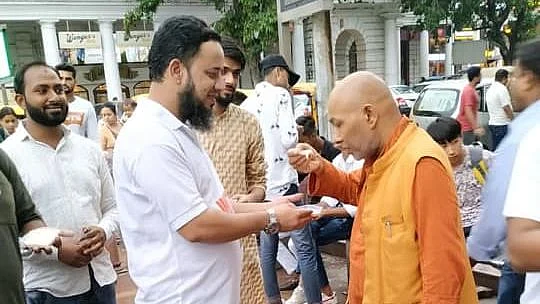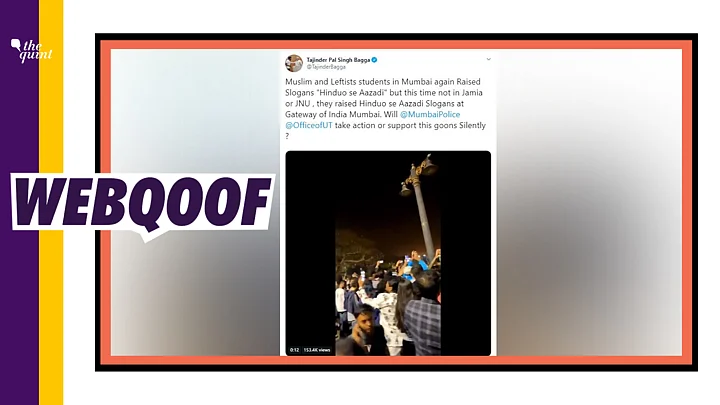Speaking in the Lok Sabha on the communal violence in Northeast Delhi, Union Home Minister Amit Shah picked on a curious target: a citizens’ campaign called United Against Hate.
“United Against Hate – the name sounds so pious but look what they advocated. They said, ‘(Donald) Trump is about to come, we should block the streets’,” Shah said, insinuating that this led to violence in Northeast Delhi.
Earlier on Wednesday 11 March, Meenakshi Lekhi cited the same comment and attributed it to former JNU student Umar Khalid, who is associated with the United Against Hate campaign. “They call themselves United Against Hate but they themselves spread hate,” she said.
BJP MP from Bengaluru South, Tejaswi Surya, who spoke just before Shah, also made the same allegation.
So the question is: why is the Narendra Modi government targeting ‘United Against Hate’? First a bit about the group itself.
What is United Against Hate?
United Against Hate (UAH) is a campaign that was started in July 2017 in response to the series of lynchings that had taken place around that time.
The immediate trigger for the UAH campaign is said to have been the lynching of 15-year-old Mohammad Junaid in Haryana’s Ballabhgarh, on 22 June 2017, when he was returning home after shopping for Eid.
Several citizens from from across India joined in the campaign, mainly because of the outrage following Junaid’s killing as well as the lynchings that had taken place earlier.
Three of the founders of UAH are activists Nadeem Khan, Banojyotsna and Umar Khalid.
Over time, several people whose kin were victims of hate crimes or caste and religion based harassment, became part of the campaign. Most prominent among these are Fatima Nafees, the mother of missing JNU student Najeeb Ahmed and Radhika Vemula, mother of the late Hyderabad Central University research scholar Rohith Vemula.
In addition to conducting protests against lynchings, UAH also began documenting hate crimes across the country. After a hate crime in any part of India, its team would often approach the victims’ family and try to provide help.
They have made crucial interventions in cases like Tabrez Ansari’s lynching as well as the Kasganj communal violence, and they have also tried to document the people affected by the National Register of Citizens in Assam.
In July 2019, they took another major step by launching a hate crime helpline 1800-3133-60000 for victims of hate crimes. According to a report in Mint, the UAH helpline was used to prevent a possible communal altercation in Dausa, Rajasthan.
A slight change of focus took place after the passage of the Citizenship Amendment Act in December 2019, with UAH giving its full support to the campaign against the CAA, NRC and NPR.
Even though their main focus is on hate crimes, they also organise interfaith celebrations on festivals like Eid and Diwali.
Why Is Modi Govt Targeting UAH?
Amit Shah and Meenakshi Lekhi’s statements in Parliament are only one part of the story.
On 26 February, the Delhi Police arrested Khalid Saifi, who is also associated with UAH, from the protest site in Khureji. Activists as well as Saifi’s family accuse the Delhi Police of beating him up in custody.
They allege that he was fine when he was taken away by the police but now he has fractures on both legs and he is unable to walk.
Saifi still remains in custody.
Activists based in Khureji claim that Saifi was in fact trying to resolve the deadlock between the police and the protesters who had blocked the road.
The targeting of UAH seems to stem from the fact that the group was countering the government on a number of key fronts: lynchings, communal violence, NRC and CAA and their network managed to ensure that the protests against these issues didn’t remain localised.
What also made UAH a crucial adversary for the government is that with its broad mission – of fighting hate – it has been able to unite diverse forces: not just Muslims but also other minorites, Dalits, tribals, farmer activists, Left activists and feminists.
UAH Response to Amit Shah’s Comments
UAH has denied the allegations levelled by Union Home Minsiter Amit Shah and BJP MPs. In a statement, they said that they are “appalled” by the allegations and accused BJP of “trying to weave a false narrative”.
Regarding the specific allegation about Khalid’s statement, UAH said:
“The BJP MPs also referred to a clipped video (42 seconds long) from a longer speech of Umar Khalid, one of our activists, which he delivered in Amravati, Maharashtra, on the 17th of February. In that clip, he is heard saying, ‘on the 24th (of February), when Donald Trump comes to India, we will tell that the Prime Minister and Government of India are trying to divide the country; they are destroying the values of Mahatma Gandhi; and that the people of India are fighting against the rulers. If the rulers want to divide India, the people of India are ready to work towards uniting the country. We will come out on the streets. Will you people come out?’’ According to Home Minister and his cohorts, these words uttered in Maharashtra instigated violence in Delhi, after seven days. Very craftily they have omitted other parts of his speech where Umar Khalid had said that the only two weapons we will use in this struggle are those given by Mahatma Gandhi – Ahimsa and Satyagraha – and that we will fight against hate with love.”
(At The Quint, we question everything. Play an active role in shaping our journalism by becoming a member today.)



